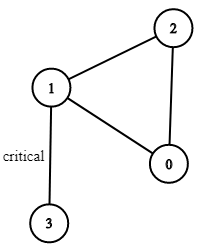There are n servers numbered from 0 to n - 1 connected by undirected server-to-server connections forming a network where connections[i] = [ai, bi] represents a connection between servers ai and bi. Any server can reach other servers directly or indirectly through the network.
A critical connection is a connection that, if removed, will make some servers unable to reach some other server.
Return all critical connections in the network in any order.
Example 1:
Input: n = 4, connections = [[0,1],[1,2],[2,0],[1,3]] Output: [[1,3]] Explanation: [[3,1]] is also accepted.
Example 2:
Input: n = 2, connections = [[0,1]] Output: [[0,1]]
Constraints:
2 <= n <= 105n - 1 <= connections.length <= 1050 <= ai, bi <= n - 1ai != bi- There are no repeated connections.
class Solution:
def criticalConnections(
self, n: int, connections: List[List[int]]
) -> List[List[int]]:
def tarjan(a: int, fa: int):
nonlocal now
now += 1
dfn[a] = low[a] = now
for b in g[a]:
if b == fa:
continue
if not dfn[b]:
tarjan(b, a)
low[a] = min(low[a], low[b])
if low[b] > dfn[a]:
ans.append([a, b])
else:
low[a] = min(low[a], dfn[b])
g = [[] for _ in range(n)]
for a, b in connections:
g[a].append(b)
g[b].append(a)
dfn = [0] * n
low = [0] * n
now = 0
ans = []
tarjan(0, -1)
return ansclass Solution {
private int now;
private List<Integer>[] g;
private List<List<Integer>> ans = new ArrayList<>();
private int[] dfn;
private int[] low;
public List<List<Integer>> criticalConnections(int n, List<List<Integer>> connections) {
g = new List[n];
Arrays.setAll(g, k -> new ArrayList<>());
dfn = new int[n];
low = new int[n];
for (var e : connections) {
int a = e.get(0), b = e.get(1);
g[a].add(b);
g[b].add(a);
}
tarjan(0, -1);
return ans;
}
private void tarjan(int a, int fa) {
dfn[a] = low[a] = ++now;
for (int b : g[a]) {
if (b == fa) {
continue;
}
if (dfn[b] == 0) {
tarjan(b, a);
low[a] = Math.min(low[a], low[b]);
if (low[b] > dfn[a]) {
ans.add(List.of(a, b));
}
} else {
low[a] = Math.min(low[a], dfn[b]);
}
}
}
}class Solution {
public:
vector<vector<int>> criticalConnections(int n, vector<vector<int>>& connections) {
int now = 0;
vector<int> dfn(n);
vector<int> low(n);
vector<int> g[n];
for (auto& e : connections) {
int a = e[0], b = e[1];
g[a].push_back(b);
g[b].push_back(a);
}
vector<vector<int>> ans;
function<void(int, int)> tarjan = [&](int a, int fa) -> void {
dfn[a] = low[a] = ++now;
for (int b : g[a]) {
if (b == fa) {
continue;
}
if (!dfn[b]) {
tarjan(b, a);
low[a] = min(low[a], low[b]);
if (low[b] > dfn[a]) {
ans.push_back({a, b});
}
} else {
low[a] = min(low[a], dfn[b]);
}
}
};
tarjan(0, -1);
return ans;
}
};func criticalConnections(n int, connections [][]int) (ans [][]int) {
now := 0
g := make([][]int, n)
dfn := make([]int, n)
low := make([]int, n)
for _, e := range connections {
a, b := e[0], e[1]
g[a] = append(g[a], b)
g[b] = append(g[b], a)
}
var tarjan func(int, int)
tarjan = func(a, fa int) {
now++
dfn[a], low[a] = now, now
for _, b := range g[a] {
if b == fa {
continue
}
if dfn[b] == 0 {
tarjan(b, a)
low[a] = min(low[a], low[b])
if low[b] > dfn[a] {
ans = append(ans, []int{a, b})
}
} else {
low[a] = min(low[a], dfn[b])
}
}
}
tarjan(0, -1)
return
}
func min(a, b int) int {
if a < b {
return a
}
return b
}function criticalConnections(n: number, connections: number[][]): number[][] {
let now: number = 0;
const g: number[][] = Array(n)
.fill(0)
.map(() => []);
const dfn: number[] = Array(n).fill(0);
const low: number[] = Array(n).fill(0);
for (const [a, b] of connections) {
g[a].push(b);
g[b].push(a);
}
const ans: number[][] = [];
const tarjan = (a: number, fa: number) => {
dfn[a] = low[a] = ++now;
for (const b of g[a]) {
if (b === fa) {
continue;
}
if (!dfn[b]) {
tarjan(b, a);
low[a] = Math.min(low[a], low[b]);
if (low[b] > dfn[a]) {
ans.push([a, b]);
}
} else {
low[a] = Math.min(low[a], dfn[b]);
}
}
};
tarjan(0, -1);
return ans;
}
